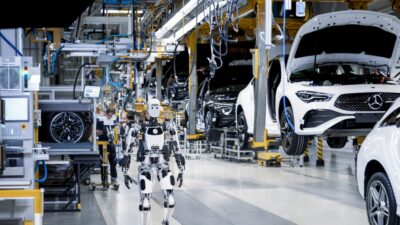TL;DR:
- Mercedes-Benz is testing the use of humanoid robots made by Apptronik to take over physically demanding and repetitive tasks in its factories.
- Labor unions have raised concerns about robots potentially replacing human workers and eliminating jobs, while companies see it as an opportunity to automate work and cut costs.
- Mercedes aims to understand the potential of robotics in filling labor gaps, freeing up skilled workers to focus on building high-quality cars.
In a bold move towards embracing cutting-edge technology, Mercedes-Benz has announced its plans to integrate humanoid robots into its factory operations. Facing challenges in finding reliable workers for physically demanding and repetitive tasks, the German automaker has partnered with Apptronik, a Texas-based robotics company, to trial the use of their innovative Apollo robots.
Standing at 5-foot-8-inches tall and weighing 160 pounds, these humanoid robots have been designed to work seamlessly alongside human counterparts on the production line. With the ability to lift up to 55 pounds, the Apollo robots will initially be tasked with delivering parts to assembly lines and conducting quality inspections. However, their true potential lies in automating low-skill, physically challenging manual labor, freeing up Mercedes’ skilled workforce to focus on building the world’s most desirable cars.
“To build the most desirable cars, we continually evolve the future of automotive production: Advancements in robotics and AI open up new opportunities also for us,” said Jörg Burzer, a member of Mercedes-Benz’s board of management. “We are exploring new possibilities with the use of robotics to support our skilled workforce in manufacturing.”
Mercedes-Benz is not alone in its quest to integrate robotics into automotive manufacturing. Other industry giants, including Tesla, Nio, and BMW, have also begun testing humanoid robots for various tasks within their facilities. While robots have been a staple in factories for decades, the introduction of humanoid robots represents a significant shift, allowing for more comprehensive automation without the need for extensive layout or production line changes.
Labor Unions Are Concerned About The Mercedes Robots Program
However, this technological advancement has not been without its critics. Labor unions have voiced concerns over the potential replacement of human workers and the elimination of jobs. They argue that companies are primarily motivated by cost-cutting opportunities and the ability to automate work. Despite these concerns, Mercedes-Benz remains steadfast in its belief that robotics will enable a more efficient and productive manufacturing process, ultimately benefiting both the company and its employees.
“Mercedes plans to use robotics and Apollo for automating some low skill, physically challenging, manual labor — a model use case which we’ll see other organizations replicate in the months and years to come,” said Jeff Cardenas, CEO and co-founder of Apptronik.
As the automotive industry continues to evolve, the integration of robotics and artificial intelligence is poised to reshape the future of manufacturing. Mercedes-Benz’s bold embrace of this technology signifies its commitment to pushing boundaries and staying at the forefront of innovation. With the potential to alleviate labor shortages, increase efficiency, and enhance workplace safety, the introduction of humanoid robots may very well be the catalyst for a new era in automotive production.
Robots are revolutionizing the car factory floor. @Mercedes partners with @Apptronik to deploy humanoid #robots. #MercedesRobots #Robots #Mercedes #FutureOfWork Share on X
Frank Wilson is a retired teacher with over 30 years of combined experience in the education, small business technology, and real estate business. He now blogs as a hobby and spends most days tinkering with old computers. Wilson is passionate about tech, enjoys fishing, and loves drinking beer.























 How Amazon’s 16 Leadership Principles Help Drive Innovation and Impact at Scale
How Amazon’s 16 Leadership Principles Help Drive Innovation and Impact at Scale
Leave a Reply
You must be logged in to post a comment.